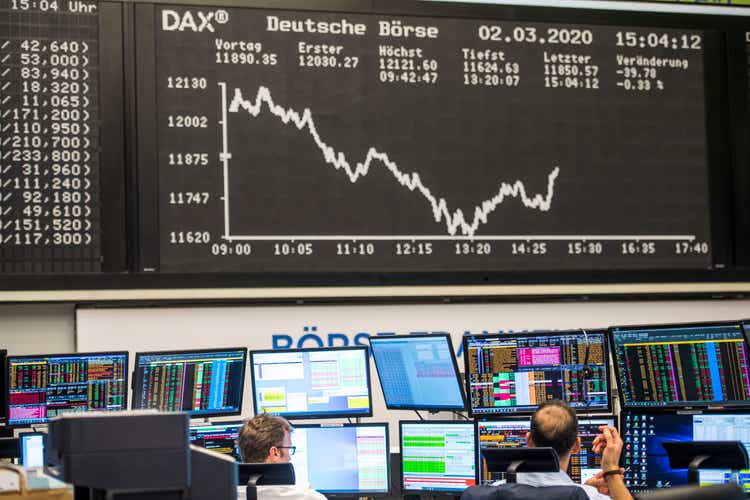Deutsche Boerse – Fundamental Upside In This EU Stock Market Operator
[ad_1]
Thomas Lohnes/Getty Images News
Dear readers,
Deutsche Börse (OTCPK:DBOEY) (OTCPK:DBOEF) is what is called an “offering marketplace”, or stock exchange for the trading of shares and securities, as well as a transaction services provider.
Its task is to give investors and investment companies access to the global capital market. Its history goes back to 1992-1993 and the company is headquartered in Frankfurt, Germany.
In this article, I will show you why I own, and why I consider it a good idea to own shares in this operator.
Deutsche Börse
Delving into the German stock market
So, numbers to begin, there are over a thousand companies listed with a combined stock market capitalization in the trillions.
The business has revenues in the billions, operates at appealing EBITDA/Operating margins of around 53-55% on an EBITDA basis, and unlike some of its peers, pays a dividend of over 2% at the current valuation.
The company has an AA credit rating, and its subsidiary has an AA credit rating. Some actually claim that Deutsche Börse goes back over 400 years, to 1585, but the clear roots are the “Frankfurter Wertpapierbörse AG”, which was a German LLC that changed its name in late 1992.
IPO was in 2001, and its competitive advantage was simple – digital/electronic trading as opposed to floor trading. This eventually went on to almost replace floor trading, and it was known as Xetra back in 1997 – a name that still sticks today.
Clearstream, the European leading supplier of post-trading services (including things like dividend payouts), is a wholly-owned subsidiary of Deutsche Börse. Its mission is to ensure effective cash and security delivery between parties and it manages/administers and safekeeps all of the securities it holds on behalf of its investor customers. So, that is also part of Deutsche Börse. This is also the subsidiary that I was referring to, with AA credit from S&P Global.
This combination of services gives it a distinct advantage over most of its competitors because its offerings are broad enough to cover the entire process chain. This means that European banks are customers of Deutsche Börse, as many of their operations for investors are routed through Deutsche.
The company’s focus has been the “Europeanization” of its operations. It sold the US subsidiary ISE to Nasdaq (NDAQ) and its stake in BATS Global back in 2016 and 2017 respectively. It’s done a few M&As, such as Axioma, a risk management software provider which was spun into its index (DAX/STOXX) operations back in 2019.
On a high level, Deutsche makes money/sales revenue from the following operations.
- Eurex (Financial Derivatives)
- Clearstream (Post-trading)
- Xetra (Cash Equities)
- IFS (Investment Fund Servicing)
- IIS (Institutional Services)
- 360T (Foreign Exchange)
- EEX (Commodities Trading)
- Qontigo (Index/Analytics)
As well as an “other/data” segment. The primary sales revenue generators are Eurex and Clearstream, which together account for more than…
[ad_2]
Read More: Deutsche Boerse – Fundamental Upside In This EU Stock Market Operator
